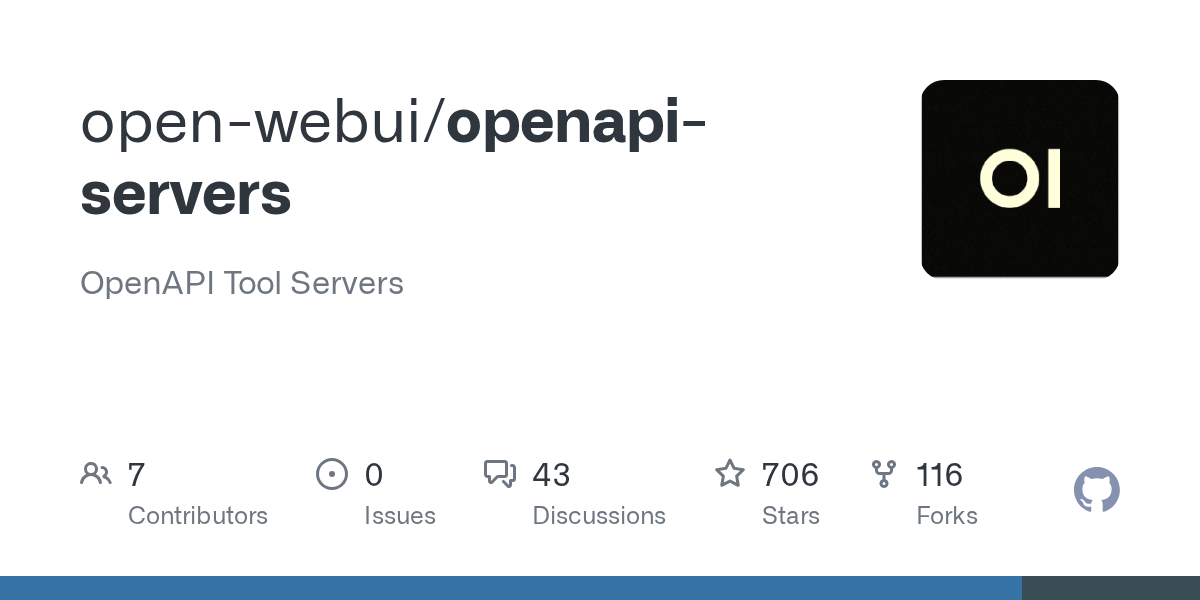openapi-servers: Reference Implementations for LLM Tool Integration

Summary
The openapi-servers repository provides reference implementations for OpenAPI Tool Servers, simplifying the integration of external tools and data sources into LLM agents and workflows. By leveraging the OpenAPI specification, it ensures secure and easy communication without proprietary protocols. This project aims to accelerate the development of powerful AI applications by offering battle-tested, standard-compliant server examples.
Repository Info
Tags
Click on any tag to explore related repositories
Introduction
The openapi-servers repository offers a collection of reference OpenAPI Tool Server implementations designed to streamline the integration of external tooling and data sources into Large Language Model (LLM) agents and workflows. These implementations prioritize ease of use and security, utilizing the widely adopted and battle-tested OpenAPI specification as the standard communication protocol. By adopting OpenAPI, the project eliminates the need for proprietary or unfamiliar communication methods, enabling developers to quickly and confidently build or integrate servers that enhance AI applications.
Installation
Getting started with openapi-servers is straightforward. You can clone the repository and run the examples locally using Python or Docker.
First, clone the repository:
git clone https://github.com/open-webui/openapi-servers
cd openapi-servers
To run a specific server, for instance, the filesystem server:
# Example: Installing dependencies for a specific server 'filesystem'
cd servers/filesystem
pip install -r requirements.txt
uvicorn main:app --host 0.0.0.0 --reload
Alternatively, you can use Docker:
cd servers/filesystem
docker compose up
Once running, point your OpenAPI-compatible clients or AI agents to the deployed URL.
Examples
The repository provides several reference implementations demonstrating common use cases for OpenAPI tool servers:
- Filesystem Access: Safely manage local file operations with configurable restrictions.
- Git Server: Expose Git repositories for searching, reading, and writing via controlled API endpoints.
- Memory & Knowledge Graph: Implement persistent memory management and semantic knowledge querying.
- Weather Server: Provide current weather conditions and forecasts from trusted public APIs.
- Get User Info Server: Access and return enriched user profile information from authentication providers.
- SQL Chat Server: Connect to SQL databases to automatically generate, execute, and optimize queries based on schema and natural language input, supporting chat-based data exploration and RAG.
- External RAG Tool Server: Integrate and execute custom or third-party Retrieval-Augmented Generation (RAG) pipelines as callable API tools.
Why Use OpenAPI?
Leveraging OpenAPI as the foundation for these tool servers offers significant advantages:
- Established Standard: OpenAPI is a widely used, production-proven API standard supported by a vast ecosystem of tools, companies, and communities.
- No Reinventing the Wheel: Developers familiar with REST APIs or OpenAPI can immediately start building, eliminating the need for custom documentation or proprietary specifications.
- Easy Integration & Hosting: Tool servers can be deployed externally or locally without vendor lock-in or complex configurations.
- Strong Security Focus: Built on HTTP/REST APIs, OpenAPI inherently supports secure communication methods including HTTPS and proven authentication standards like OAuth, JWT, and API Keys.
- Future-Friendly & Stable: Unlike less mature protocols, OpenAPI ensures reliability, stability, and long-term community support, making it a future-proof choice for AI applications.
Links
- GitHub Repository: open-webui/openapi-servers
- Community Discussions: Discussions Page
- License: MIT License
- OpenAPI Specification: OpenAPI.org
- MCP to OpenAPI Bridge: mcpo